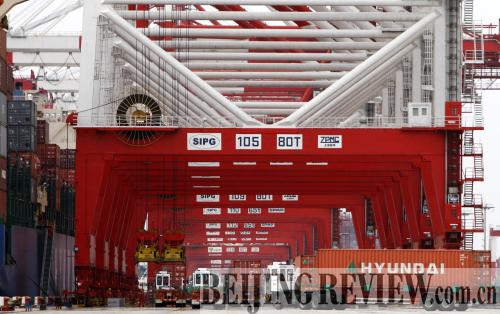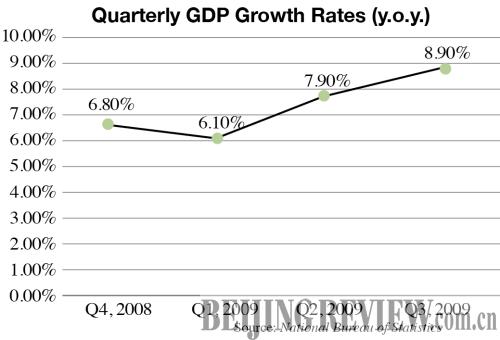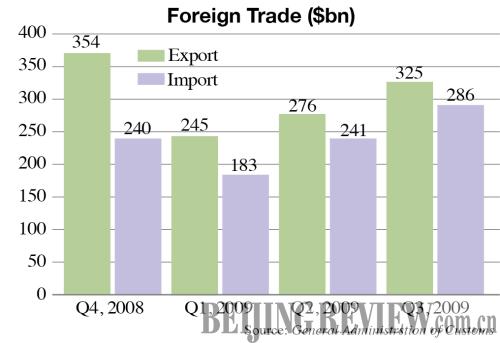|
 |
|
EXPORT HOPES: Equipment at a dock stand in Shanghai Port ready to load freight onto waiting cargo ships (PEI XIN) |
In a sign of export strength, a recent rush of Christmas orders has kept many Chinese factories busy filling orders. In addition, the October session of the Canton Fair, a bellwether for foreign trade, has also seen a dramatic surge in foreign purchases and buyers compared with April's session, an indication that foreign buyers are becoming less stringent with their money.
Economists believe the economic fallout has made international consumers and businesses more price conscious. The change in purchasing habits is paving the way for cost-efficient Chinese manufacturers to win a larger piece of the shrinking global export pie, providing an adequate explanation as to how China could soon overtake Germany as the world's biggest exporter.
Inflation or deflation?
Even with economic activity picking up, China is still experiencing deflation, with the consumer price index (CPI) falling 1.1 percent and the producer price index (PPI) sliding 6.5 percent year on year from January to September.
Conversely, a flood of low-interest credit has found its way into the economy, setting the stage for inflationary pressures to build up. A glimpse at the real estate market could give a clue as to how overwhelming the liquidity explosion is—loose monetary policies allowed housing prices nationwide to take a wild upswing, raising concerns that an asset bubble is slowly expanding.
By reining in loan growth, the central bank attempted to tame the credit tiger. Newly added renminbi denominated loans in the third quarter totaled 1.283 trillion yuan ($187.7 billion), only 28 percent that of the first quarter and 46 percent that of the second quarter this year.
The lending tap can be easily switched on and off. But before the economy gets a solid footing, it is difficult to see how policymakers can pour cold water on the property boom. Given the choices between pricking asset price inflation or underpinning the upward momentum, China still intends to live with the bubbles, said analysts.
Li Xiaochao, a spokesman for the NBS, said at a news conference that the government would continue with loose monetary policies and keep a vigilant eye on inflationary expectations.
Justification does exist to put up defenses against inflation considering the potential for a ripple effect of the run-up in international commodity prices, said Li Yang, Deputy Director of the Chinese Academy of Social Sciences. Even if this were to happen, modest inflation at the level of 2-3 percent will be more of a boon than a blow to the economy, he added.
Looking ahead
As the recovery solidifies, the tone and language of the policy guidance will be increasingly cautious on inflation and overcapacity. However, it's believed that real tightening measures will only commence in spring 2010, said a Bank of America Merrill Lynch Global Research report.
By that time, if predictions hold true, the CPI and PPI will have turned positive and export growth will have returned. Real austerity measures will be introduced to control investment growth and credit expansion, the report states.
Li Daokui, a senior economist with Tsinghua University, suggested a flexible and gradual approach to phase out government stimulus in line with unfolding situations. More efforts are needed to improve the livelihood of the residents and the rural economy, he said.
Lian Ping, chief economist with the Bank of Communications, agreed. It is most likely that the policymakers will switch to a neutral monetary stance in the first half of next year to ensure the health of the economy.


| 